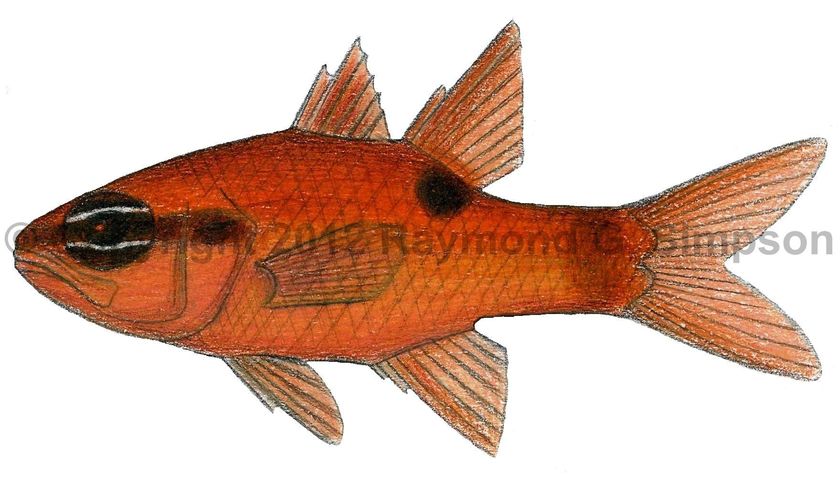
Common Name
Flamefish
Year Described
Poey, 1860
Identification
Dorsal Fin: VI, I-9
Anal Fin: II, 8
Pelvic Fin: I, 5
Pectoral Fin: 12
Gill Rakers: 4-5 upper, 13-14 lower
Vertebrae: 10 precaudal, 14-15 caudal
A small fish with a fairly robust and moderately compressed body. Eye is large and the snout short. Mouth is fairly large and oblique, with the lower jaw slightly protruding. Both jaws, palatine, and vomer with narrow bands of villiform teeth (no canines). Preopercular edge with a slightly serrate margin. Preopercular flap does not extend past the preopercular rear margin. There are two dorsal fins. The caudal fin is emarginate. Body scales ctenoid. Predorsal scales 7-8. Scales around the caudal peduncle 19-20.
Color
Body bright orange-red to red (not translucent in adults). A large circular blotch (smaller than eye) under second dorsal fin. A dark saddle blotch on the caudal peduncle varies from faint to obvious. A dark stripe passes from snout, through the eye, and onto opercle. Two bright white stripes on eye. Fins a lighter shade of body color (rarely with dusky red tips).
Size
Maximum size to 85mm SL.
Habitat
Coral, rocky, and artificial reefs from 1-100m (usually in shallow water). Found in dark caves and recesses.
Range
Massachusetts to Venezuela, including the Gulf of Mexico and the Caribbean Sea. Also Bermuda.
References
Gon, O. 2002. Apogonidae (pp 1386-1391). In: Carpenter. 2002. The living marine resources of the Western Central Atlantic. Vol. 3: Bony fishes part 2 (Opistognathidae to Molidae), sea turtles and sea mammals. FAO Species Identification Guides for Fisheries Purposes. American Society of Ichthyologists and Herpetologists Special Publication No. 5.
McEachran, J.D. & J.D. Fechhelm. 2005. Fishes of the Gulf of Mexico. Volume 2: Scorpaeniformes to Tetraodontiformes. University of Texas Press, Austin. i-viii +1-1004.